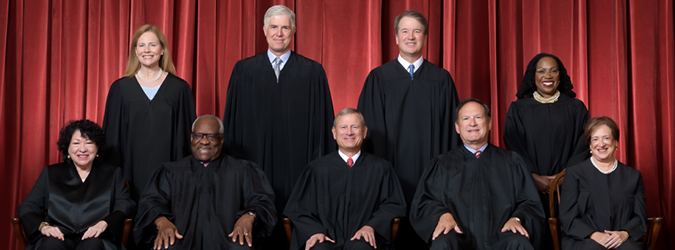U.S. Supreme Court Roundtable: Immunity, Ethics and Term Limits
8.2.2024

The U.S. Supreme Court continues to make news with its decisions this spring on issues from presidential immunity to the role federal agencies play in making and enforcing government regulations.
The Miranda Warnings Roundtable tackled these and other questions during a lively podcast this month.
The full episode is available below, on Apple and Google Play and on our New York State Bar Association YouTube channel.
The panelists, Vin Bonventre, a professor of constitutional law at Albany Law School, and communications and political strategist Liz Benjamin started the discussion by reacting to the court’s decision on presidential immunity from criminal prosecution.
“There is nothing in the Constitution that suggests that the president has immunity at all for absolutely anything,” Bonventre said. “It’s not mentioned in the Constitution. And yet the textualist and the originalists just line up. Oh, yeah, there’s immunity.”
The panel moved on to discuss the decision in Loper Bright Enterprises v. Raimondo in which the court overruled the longstanding Chevron doctrine. Under the Chevron precedent, federal courts showed deference to the decisions made by an executive agency. The Raimondo decision now gives the court more latitude to interpret government regulations.
“I think the major impact that will be felt is that the court can now disregard environmental protections of the EPA or worker protections of OSHA,” Bonventre said. “These agencies are filled with people who are scientific and data-driven experts. And you know, political Conservatives aren’t too crazy about that.”
“The whole purpose of having a cadre of government workers who are ostensibly not appointed and don’t work at the pleasure of the executive is to have institutional knowledge, and individuals who make decisions based on science and based on data that has nothing to do with politics. This decision undercuts that,” Benjamin said.
Taking a counterview, Bonventre agrees with the U.S. Supreme Court that government agencies serve as both judge and jury and sometimes decisions do need to go before a judge.
“I think what Chief Justice Roberts is saying in this case has a great deal of merit. You have an administrative agency, they promulgate the regulations, then they investigate violations, then they prosecute the violations, and then they decide what the penalties are going to be.”
“One of the principles of adjudications is that we don’t allow people to rule on a matter in which they have an interest, and in these cases the administrative agencies have an interest because they promulgated their own regulations. They’ve prosecuted it. And now they’re also the judge. So again, I think there’s a great deal of merit requiring a jury trial.”
The conversation turned to new efforts by the Biden Administration to change the makeup of the court. In July, President Biden unveiled a proposal to create term limits and a code of ethics for justices.
“We just saw the current sitting president basically get bullied out of running because of questions related to his mental acuity and and physical frailty,” said Benjamin. “So, it’s possible that somebody at the Supreme Court level would get run out on a rail, but the pressure would have to be enormous. The life term just doesn’t make sense in the modern era.”
Check out the lively discussion below and stay tuned for additional podcast episodes each month from the New York State Bar Association.






